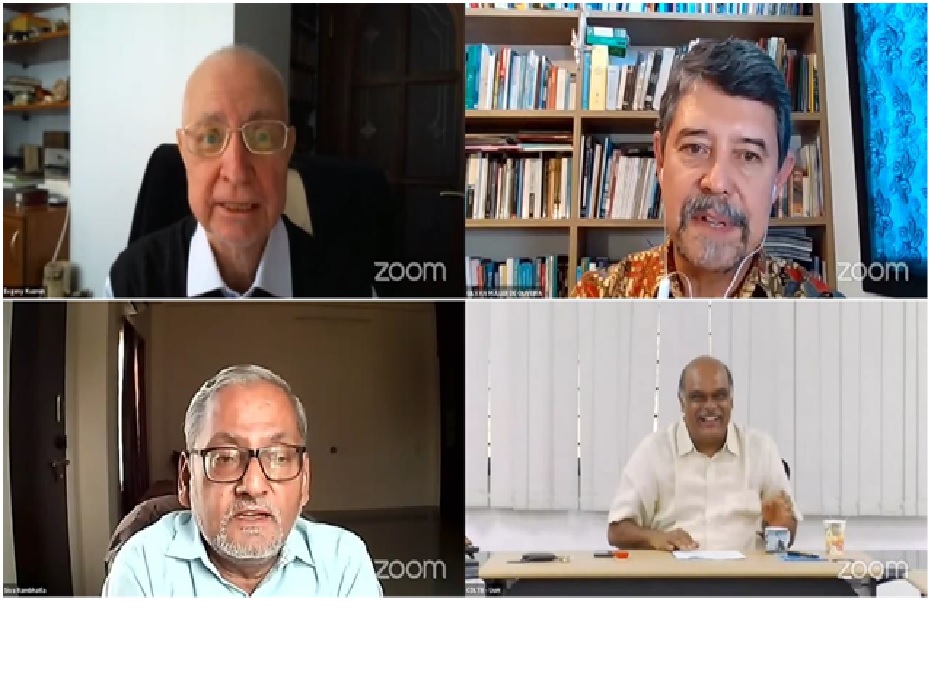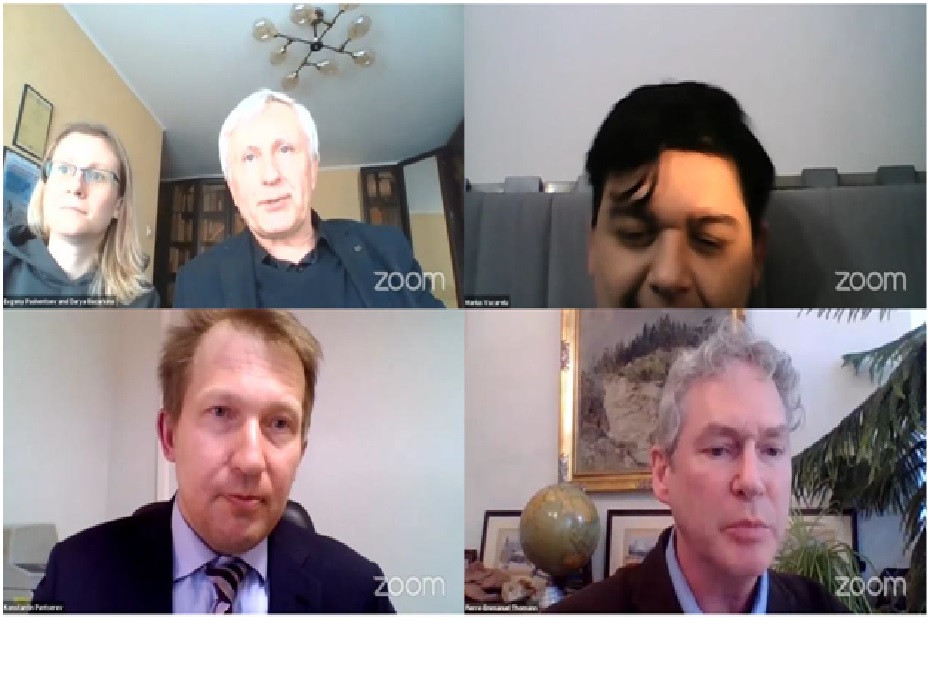On the 24-25 March 2021, the Online International Conference “Accelerating Actions and Promoting Digital Wellness in the Context of Artificial Intelligence” took place in Hyderabad (India).
The Conference was organized under the auspices of the UNESCO Intergovernmental Information for All Programme (IFAP). The group of its organizers included row of research institutions in India, South Africa, Brazil and Russia, including the India Centre of Excellence for Information Ethics (ICEIE), the University of Pretoria, the Russian National IFAP Committee, and the UNESCO Chair on Language Policies for Multilingualism and the Federal University of Santa Catarina (Brazil). The Conference was chaired by Professor Prabhakar Rao Jandhyala, Director of India Centre of Excellence for Information Ethics, Centre for Applied Linguistics and Translation Studies (CALTS), University of Hyderabad, India.
The Conference covered a wide range of topics – the place of AI in reaching global digital and general well-being, in the wellness and holistic development of indigenous communities in particular, AI as an instrument and factor of online learning, international regulation of AI production and usage by both governments and TNCs, AI countering both socio-economic and media-political problems.

Members of the Organising Committee of the Conference: Evgeny Kuzmin, Vice-Chair of the IFAP Intergovernmental Council, Chair of the UNESCO IFAP Working Group on Multilingualism in Cyberspace, Chair of the Russian National IFAP Committee, President of the Interregional Library Cooperation Centre, Russian Federation; Gilvan Muller de Oliveira, Professor, Federal University of Santa Catarina & Head, UNESCO Chair on Language Policies for Multilingualism, Brazil; Siva Prasad Rambhatla, Formerly Professor of Anthropology, Honorary Professor, Centre for Digital Learning, Training and Resources (CDLTR), University of Hyderabad, India; Prabhakar Rao Jandhyala, Director, India Centre of Excellence for Information Ethics, Centre for Applied Linguistics and Translation Studies (CALTS), University of Hyderabad, India – Chairperson of the Conference.
On the 25 March 2021 the round table “Malicious Use of Artificial Intelligence: Challenging the International Psychological Security” took place in the framework of the Conference. The round table was academically supported by the International Research Group of Specialists on the Threats to International Psychological Security through the Malicious Use of Artificial Intelligence (Research MUAI). Two papers presented at the round table by Prof. Darya Bazarkina and Prof. Evgeny Pashentsev werefunded by RFBR and VASS, on the research project No 21-514-92001 “Malicious Use of Artificial Intelligence and Challenges to Psychological Security in Northeast Asia”.

Participants of the round table “Malicious Use of Artificial Intelligence: Challenging the International Psychological Security”: Darya Bazarkina, Evgeny Pashentsev, Marius Vacarelu, Konstantin Pantserev and Pierre-Emmanuel Thomann.
The round table was co-chaired by Evgeny Pashentsev (DSc., Professor, Leading Researcher at the Diplomatic Academy of the Ministry of Foreign Affairs of the Russian Federation, Director of the International Center for Social and Political Studies and Consulting, Coordinator of the Research MUAI Group), and Darya Bazarkina (DSc, professor of the Institute of Law and National Security, Russian Presidential Academy of National Economy and Public Administration, member of the Research MUAI Group), who also presented papers.
Evgeny Pashentsev opened the session with the presentation “Malicious Use of Artificial Intelligence through Agenda-Setting: the Risks Are Rising”. According to the research presented, the process of agenda-setting – which is based on the significant role of media in defining the important issues of the day – is increasingly dependent on the algorithms of information collection, proceeding, storytelling, etc., which makes them especially vulnerable to malicious use. The latter is highly relevant in the context of the global decline of democratic institutions and the geopolitical rivalry that motivate antidemocratic regimes to reinforce control on the population and push not only state but also non-state actors to intensive economic competition. The force of AI-enabled malign informational campaigns will stem from the individualized analysis of the target audience. Hence, socially-oriented development models promotion, using AI to detect and neutralize perception management campaigns, analytical and monitoring centers establishment to detect the threats of MUAI were suggested as possible recommendations.
The next presentation, “Morality and AI tools in Political Campaigns” by Marius Vacarelu (PhD, professor at National School of Political and Administrative Studies, member of the Research MUAI Group (Romania)), was dedicated to the limitations of morality and political behavior put on the AI regulation as well as on its usage during campaigns. According to Dr. Vacarelu, the motivation for power and self-realization through power differs politicians from the other groups of citizens who are willing foremost to implement measures to improve their own living conditions. This difference, in combination with the social role of politicians, requires special institutions for learning to be politicians – and, in particular, to use a wide range of tools for campaigns, including AI. The latter can make the cost of the campaign extremely high but is hardly possible to be regulated, firstly, because of the reputational benefits and threats for political rivals the AI-based technologies can bring to the campaigners, secondly, because of the “permanent” character of the political campaign in the modern informational space. That poses questions of the moral use of AI – as well as of AI’s own “moral compass” development.
The following presentation of Konstantin A. Pantserev (DSc., professor at Saint-Petersburg State University, member of the Research MUAI Group (Russia), “The Existing Practice of Malicious Use of AI in Sub-Saharan Africa” was devoted to the problem of ensuring information security in Africa. After giving few examples of malicious use of advanced technologies in Africa, Prof. Pantserev came to the conclusion that, while paying great attention to the development of the information and telecommunications industry on their territory, the countries of Sub-Saharan Africa have made no efforts aimed on the strengthening of their information security, including in matters related to the use of AI technologies. In order to illustrate this statement, Prof. Pantserev has shown remarkable data: today, more than 60% of African enterprises do not train their employees in cybersecurity, and more than 90% of large African companies spend less than $ 10,000 to ensure their cybersecurity. It makes African – and Sub-Saharan – enterprises especially vulnerable to such AI-related threats as intelligent attacks on systems, reliable system components simulation, putting devices under a malign control through private keys, affecting voice or visual authentication and hiding malicious codes in official apps. And Nigeria, Kenya and South Africa are among the top 3 African states that suffer the most losses from cybercrime. In order to mitigate the threats posed by the malicious use of advanced technologies in Africa, K. Pantserev recommended putting cybercrimes to the Pan-African agenda.
In the presentation of Pierre-Emmanuel Thomann, (PhD, professor at Eurocontinent-Brussels-Belgium Lyon 3 Jean Moulin University, member of the Research MUAI Group (France) titled “EU Main Policies and Paradigms Regarding AI, and Its Ability to Anticipate New Geopolitical Challenges through the MUAI and its Threat to IPS” the problems of the EU AI regulation were represented. According to Dr. Thomann, AI, monopoly on this technology and spreading data regulation laws are potential instruments for digital imperialism which is turning a relevant contemporary issue. It complements tactical threats – from AI-using computing propaganda to attacks on the critical infrastructure. The EU, however, focuses on the safety and liability of products circulating within its borders and does not address using AI for military purposes. In the long-term prospect, the European approach based on the “trustworthy AI” image can become a competitive advantage for the EU, but it cannot work in the contemporary conditions of the USA and China ignoring EU rules, the EU-USA competition on the issue of data control and the European deindustrialization putting its second digital revolution leadership under threat.
The final floor was given to Darya Bazarkina with the presentation titled “MUAI and Terrorist Communication: Future Threats”. She emphasized that the military defeat of the so-called “Islamic State” (IS) provoked the transit from direct armed clashes to removed attacks work within a network structure where communications in the virtual space play a key role. In this context terrorism continues overlapping with cybercrimes, using advanced technologies both for propaganda and for physical destruction of the victim. AI is able to change the recruitment mechanism simplifying personal tracking digital traces and constructing the individualized content. The threat is exacerbated by the low public awareness not only on the AI technology development but also on the means of psychological influence used by terrorists.
The recommendations made by the conference participants, including the ones of the round table, were included in the Hyderabad Declaration, the final document of the conference, which is expected to be an important milestone in the development of international scientific cooperation on AI policy issues.



 0
0 12324 Views
12324 Views 15 April 2021
15 April 2021 Darya Matyashova, Researcher, Saint-Petersburg State University
Darya Matyashova, Researcher, Saint-Petersburg State University